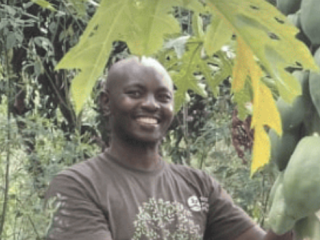Green works and nature-based solutions to address climate and nature crises

Online
Green works and nature-based solutions to address climate and nature crises
FOCUS IN CONTEXT-SPECIFIC MEASURES TO PREVENT TRADE-OFFS AND MALADAPTATION
1–26 Junho 2026
Apresentação do curso
Nature and climate are intimately connected with the world of work. Some 1.2 billion jobs in sectors such as farming, fisheries, forestry and tourism are dependent on the effective management and sustainability of healthy ecosystems. Half of the world's Gross Domestic Product is, to a greater or lesser degree, dependent on nature. The loss of biodiversity and climate change have therefore negative impacts not only on ecosystems, but also on jobs, economies, and livelihoods. Millions of people are already experiencing higher temperatures and extreme weather events, such as heat waves, droughts, and increased flooding, which are putting food security, water supply and jobs at risk. Vulnerable groups, especially in developing countries, will suffer the most from the changing weather patterns, not only because they are more exposed to climate-related impacts, but also because they have less access to social and financial support, including social protection. A just transition is about supporting developing countries and the most vulnerable to adapt their economies, labour markets and infrastructure to the effects of climate change and biodiversity loss. Holistic just adaptation measures such as green works, nature-based solutions or both can help us address both the climate and biodiversity crises. However, equal importance needs to be given to identifying and negotiate potential trade-offs in order to prevent maladaptation. This course explores how to effectively design, implement and monitor projects in adaptation measures to transition to a greener and more resilient society. By undertaking a review of different approaches, examples and best practices, participants will learn more on how to identify and develop interventions that reduce future impact of climate change, while providing employment opportunities and enhancing the productive capacity of ecosystems. The course will have a specific focus on: - Designing implementation adaptation measures - the development of green works using a local resource-based approach, nature-based solutions, hybrid approaches - Identification and negotiation of trade-offs to prevent maladaptation - Deep dive in 4 key sectors: - Forestry - Agriculture - Construction - Transportation
Perfil dos participantes
The course targets professionals involved in designing and implementing local, sectoral, national and global strategies for the transition to greener economies and climate change adaptation working in developing countries. The course specifically targets: - Government officials operating at the local, provincial and national level; - ILO, UN staff and development practitioners; - Donor organizations who are working or would like to work on climate change - Adaptation and just transition; - Public investment and employment policy advisors; - Research and education institutions.
What?
The course covers the following four modules:
Learning Block 1
Climate change, biodiversity loss and the rationale for green works, nature-based solutions or both
Learning Block 1 will provide a general overview of the linkages between climate change, biodiversity loss and the world of work, as well as the rationale for implementing green works, nature-based solutions, or both. Solutions are context-dependant, thus somethings a hybrid approach between grey infrastructure and NbS should be considered to prevent trade-offs that can result in maladaptation.
More specifically, it will cover the following topics:
- Overview of the ILO Employment-Intensive Investment Programme (EIIP)’s mandate and approach
- Climate change, biodiversity loss and its impact on the world of work and livelihoods
- The rationale for implementing adaptation measures such as green works and/or nature-based solutions
- The identification and negotiation of trade-offs to prevent maladaptation
Learning Block 2
Climate change adaptation measures in forestry & agriculture
Forests are among the most important natural resources, providing industry with materials, communities with livelihoods, and plants and animals with habitat, especially for indigenous people and local communities. Agriculture as well represent a key important economic sector, however, unsustainable expansion is one of the key drivers of biodiversity loss as it is occurring in tropical areas. Thus, in relation to the prevention of maladaptive measures or any other potential trade-offs, it is important to consider also having strong social and environmental safeguards.
The second module will focus on adaptation measures aimed at protecting biodiversity and forests while ensuring sustainable agriculture systems.
Specific topics include:
- Social and environmental safeguards
- Forest & agriculture as economic sectors
- Deforestation and biodiversity loss and their impact on the world of work and livelihoods for indigenous people and local communities
- Climate change adaptation measures through forestry (good practices, examples and advice
- for implementation)
- Afforestation and reforestation
- Agroforestry
Learning Block 3
Climate change adaptation measures in flood control and rural transport enhancement
Climate change has already led to greater peak flows of water in rivers and the situation is likely to get worse in the future. Even low level, non-catastrophic, flooding may impact on urban and rural living conditions, jobs, livelihoods and transport. The third module of the course introduces participants to the issues flood control and protection, focusing on the following topics:
- Flooding and their impact on the world of work and livelihoods
- Types of flood control systems (good practices, examples and advice for design and implementation)
- Rural transport improvement and maintenance to ensure that road networks can withstand the increased level of rainfall and flooding
Learning Block 4
Climate change adaptation measures for water and soil management
Climate change is expected to significantly increase soil erosion, water availability and desertification. The last module introduces participants to water management and soil and water protection works, focusing on the following topics:
- Water availability and desertification and their impacts on the world of work and livelihoods
- Irrigation and watershed development (good practices, examples and advice for implementation)
- Soil and water conservation works (good practices, examples and tips for implementation)
Key experts











